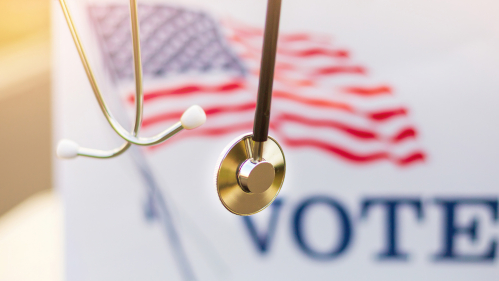How Health Care Policy Could Affect the Midterms

With Election Day upon us, Rutgers experts weigh in on how health care policy and cost may be a factor with voters.
Stephen Crystal
Director, Center for Health Services Research at the Rutgers Institute for Health, Health Care Policy and Aging Research
Distinguished Research Professor, Rutgers School of Social Work
The outcome of the midterm elections will be crucial for the future of health care in America and is likely to be on many voters’ minds as they cast their ballots. The headline health issue in the midterms will be reproductive health. This issue has motivated many new women voters to register to vote in recent months and shifted the political landscape in many states.
But other aspects of health care, such as access and price, will be on voters’ minds, too.
In a dozen states where Republican legislatures haven’t expanded Medicaid and in others where Medicaid expansion is getting the “slow walk” by state officials, the lack of access for the working poor and near poor is a crisis for many families will be on voters’ minds. Drug prices are of great concern to many. While only a partial solution, the successes of congressional Democrats in adding some ability to negotiate drug prices in Medicare and adding some cost protection for seniors may play well. The continuing impact of the opioid epidemic and the need to make treatment more accessible also weigh on voters’ minds. Uninsurance and underinsurance is a continuing challenge in much of the nation.
Kristen D. Krause
Instructor, Urban-Global Public Health, School of Public Health
Voters must understand public health is always on the ballot because our legislators and policymakers have historically determined how resources are allocated, especially in times of public health emergencies such as COVID-19, MPX and HIV/AIDS.
Currently, many of the COVID-19 protections have expired and/or are set to expire soon, including paid sick leave, free vaccinations and testing regardless of health insurance status, and tenant eviction protection. While ensuring equitable health care access and proper safeguards should always be a top priority for voters, it’s more important now than ever before. We can’t have healthy communities if all members don’t have access to safe, culturally competent and affordable health care.
Perry N. Halkitis
Dean & Hunterdon Professor of Public Health & Health Equity, School of Public Health
Distinguished Professor
In public health, we understand the well-being of people and populations are more than biomedical phenomena: It is directed in great part by the social and structural conditions that define our lives. The most pressing health issue facing all of us is the enactment of laws that strip away rights to control our own health.
In the midterm elections, results may have a profound effect on our health by undermining the privacy rights of most Americans, disempowering our ability to make our own choices about our health. Why? In the past few months, we have witnessed the erosion of the separation between church and state, with the judicial system enacting rulings that undermine reproductive rights and women’s health and HIV prevention efforts.
In June 2022, the U.S. Supreme Court dismantled the right to abortions in many parts of the nation by enabling states to enact highly restrictive abortion laws, in some instances not permitting an abortion in the case of rape, incest or the loss of the carrier’s life. This ruling stripped women of their right to choose how to manage a pregnancy.
In September, Texas federal judge Reed O’ Connor declared it was unconstitutional of the Affordable Care Act to require that insurers and employers offer plans that cover HIV-prevention drugs for free.
Both these decisions are directly linked to the midterm elections. In the wrong hands, Congress will continue to appoint judges that undermine the rights we as Americans have to privacy. In turn, such judges will facilitate the development of theocratic state based on conservation Christian ideology and undermine the health of all of us.
Peter Economou
Director, Organizational Psychology PsyD program
Graduate School of Applied and Professional Psychology
There has been a long debate about managed health care and parity between mental and physical health care coverage. In 1996, the Mental Health Parity Act was passed requiring equal coverage for physical and mental health care. The Paul Wellstone and Pete Domenici Mental Health Parity and Addiction Equity Act was passed in 2008 further specifying equal coverage of treatment for mental health and addiction, along with several other amendments and updated legislation along the way. So, for more than 20 years we have been trying to figure out health care coverage for behavioral health disorders all the while attention has grown around behavioral health and its impact on the country.
While it may not appear that mental or physical health care coverage for those not falling into one of those categories (i.e., young, poor, or marginalized) is relevant, the stress on the health care system has negative consequences such as difficulty with access to care, cost of services, and mental health disorders leading to physical health diagnoses. From the lens of a psychologist, voters must understand that mental health care has a tremendous impact on our physical health, thus making them costly disorders when they are uncovered, untreated, or misdiagnosed.


